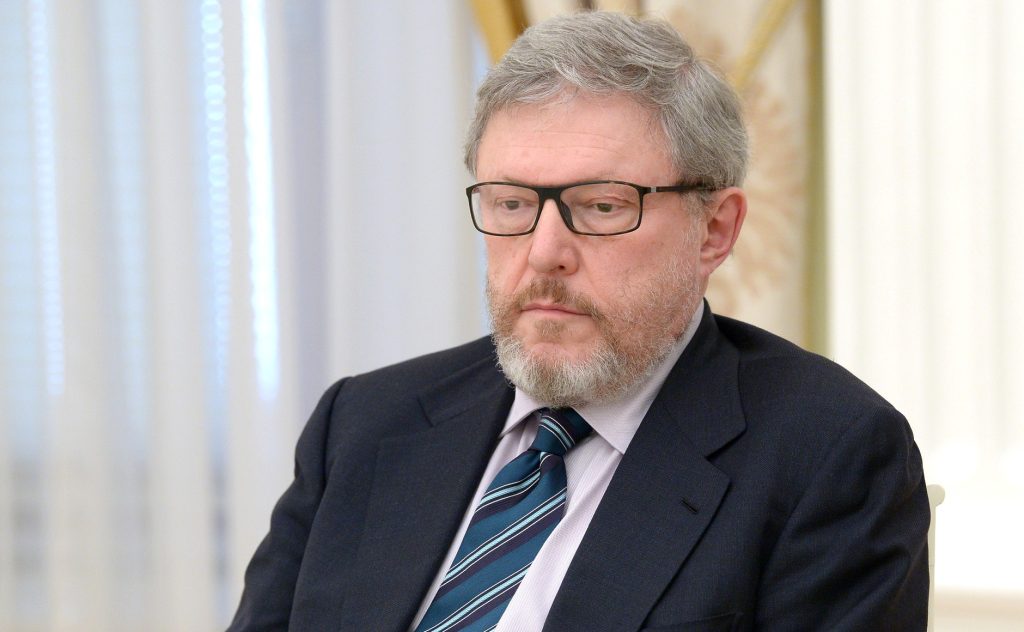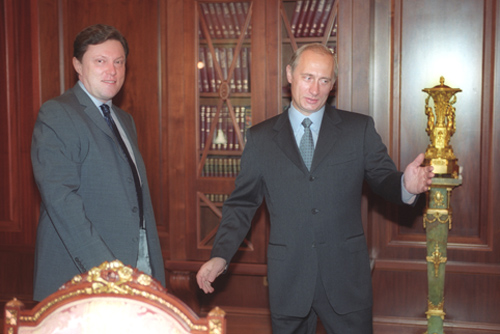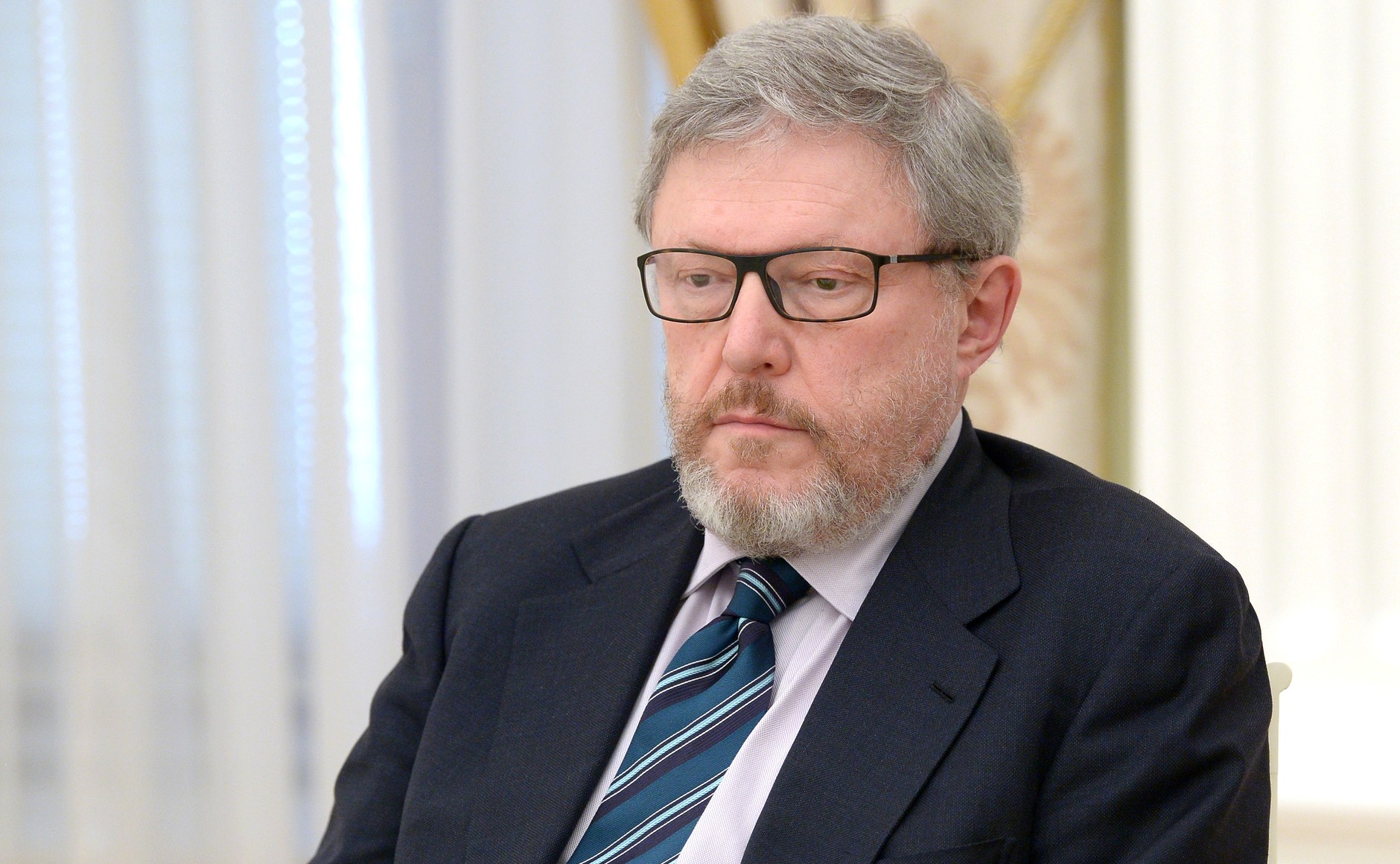
Russian politician, academic and economist Grigory Yavlinsky, who became known with his plan for a smooth transition from the Soviet regime to a free-market economy. Credit: Пресс-служба Президента Российской Федерации/Wikimedia Commons
Russian liberal politician, economist and professor Grigory Yavlinsky has long been a thorn in the side of Vladimir Putin. As the founder of the Russian United Democratic Party (Yabloko), which was the leading opposition party in post-Soviet Russia, Yavlinsky has campaigned against Putin on several occasions. In 2000 Yavlinsky participated in the Russian presidential elections under the slogan “For Russia without Dictators and Oligarchs.” In 2018, he ran in the presidential elections on an anti-corruption platform.
I first spoke to Yavlinsky in February 2012. In an interview for New Eastern Europe Yavlinsky told me he was preparing, once again, to offer Russian voters an alternative to Putin’s dictatorial reign in the Kremlin. Back then, Yavlinsky remained hopeful. “A non-democratic and corrupt system which has been created by Putin and Yeltsin, requires cardinal changes, and absolutely different politics in Russia today and important events will take place to see this happens in 2012,” Yavlinsky explained. “To change this system we need a political, economic, and moral alternative which would be supported by the people,” he added.
Today, these hopes have vanished. Why, then, do the Russian people still overwhelmingly support Moscow’s war of aggression against Ukraine? I caught up with Yavlinsky and this was the main subject I broached.
Ukraine is a subject that Yavlinsky is familiar with. He was, after all, born there, when it was part of the Soviet Union. Also, in 2018, when Yavlinsky ran in the presidential elections in Russia, he devised a plan to resolve the ongoing Russian-Ukrainian military conflict, which began in 2014.
My own interest in Ukraine is personal too. I was living in Lviv for two years. But I left the western Ukrainian city on 24 February 2022, the day of the Russian invasion.
The conversation below considers the war, as well as broader free expression battles happening in Russia right now.
Mr Yavlinsky, you were born in Lviv in 1952. Do you consider yourself Ukrainian?
I do not consider myself a Ukrainian, but I grew up in Ukraine, and studied at a Ukrainian school. I love the language and respect the culture. But regardless of where I am from, I consider the current events in Ukraine as a gigantic tragedy.
Recent surveys have indicated that an overwhelming majority of people inside Russia support this war of aggression against Ukraine. Clearly, then, it’s not just Putin’s war. Why do so many Russians support the conflict?
A lot of people [in Russia] seem to support what is happening [in Ukraine] for three reasons.
Firstly, propaganda in Russia has unfolded with great force.
Secondly, fear. Today in Russia, the fear of police and judicial harassment is huge. Finally, in Russia in the 1990s, an economic and political system was created that categorically excluded most people. It convinced the majority that they had no means of influencing what was happening in public life or the political sphere.
There also seems to be a sense that inside Russia people do not have access to their own history. Presumably this is an important weapon in Putin’s propaganda machine?
In Russia in the 1990s, the moment was missed when an honest assessment of Bolshevism, Stalin and the Soviet period should have been given. It was a huge failure in reforms, and we are now reaping the fruits of this tragic mistake. In general, people in Russia know their history very poorly.

Grigory Yavlinsky pictured with Vladimir Putin in 2000, when Yavlinsky ran for Russia’s presidency. Credit: Presidential Press and Information Office/Wikimedia Commons
Is an internal coup to bring down the Putin regime possible? Or is there simply too much fear in the Russian political system?
Today I don’t see any chance of anything like a coup against Putin. He has significant support among citizens. The scale of the opposition is completely insufficient to seriously influence the change of the state system. The reason for what is happening isn’t just about Putin – the entire Russian state and economic system has led to this.
How will western imposed sanctions against Russia affect the outcome of this war in the long term? Some critics claim, for instance, that the sanctions do not go far enough. Others have pointed out that a state that descends into poverty and chaos actually strengthens an authoritarian ruler like Putin.
The sanctions in their current form will create significant difficulties for the Russian economy, but they will not lead it to collapse. The decline in living standards will affect the middle class most of all. However, state propaganda will [blame it on] external and internal enemies. On this basis, a left-nationalist policy, national socialism can be formed. Putin will try to lead this direction. He has already talked about it. Under these conditions of a dictatorship and a police state, this will be a dangerous and difficult period.
Is Putin capable of using nuclear weapons?
Yes, I think Putin may use nuclear weapons, and this should be taken seriously.
Under what circumstances could the West become involved in a military conflict with Russia?
This is a question for politicians in the West. This may be due to provocation, or to the supply of heavy weapons. As with the use of nuclear weapons, such a danger exists.
Is there any evidence to suggest that Putin could lose his grip on power if Russia continues to suffer more military defeats in its war against Ukraine?
No matter how the military situation in Ukraine develops, there are no circumstances that can lead Putin to lose control of power in the foreseeable future.
But with more and more Russian soldiers dying, could a situation arise where Putin, under political pressure, looks for a potential compromise to end the war?
A cessation of hostilities is possible. But it will only be a temporary stop. Russia wants to build a separate civilisation and considers Ukraine a part of it. Ukraine, conversely, wants to become a European country, and considers itself an independent state. In these circumstances, any truce will be temporary.
Are you surprised at how well Ukraine has responded to this conflict?
No. I’m not surprised. [Since 2014] the armed forces in Ukraine have changed. There was a patriotic unity of the people, which became the basis of real resistance. The Kremlin expected that in the east of Ukraine [after the so called “special military operation” was launched on February 24 of this year] it would be greeted with flowers by joyful crowds of people. It turned out to be an illusion. Also, the Russian leadership did not expect such unity on the part of Western countries.
Ukraine seems to be winning the public relations war too. Why is that?
This is the gap of the post-Soviet space: Russia aspires to the 19th century, and Ukraine – to the 21st. This, [in essence] is the whole conflict. All the attention and understanding of the Russian leadership is turned back: to the Second World War, to the Soviet period, to the Russian Empire. Hence, ideological cliches about a separate civilisation. Ukraine found itself in a completely different situation. Ukraine wants to change the president regularly and have independent justice, independent private property, and be a European country.
Putin continually insisted leading up to the war that Russia would not invade Ukraine. Most western and Ukrainian politicians now believe he cannot be trusted in any diplomacy going forward. Will the Putin regime have to fall before this war ends?
Putin has talked about [his plans for Ukraine] before: in 2012, in 2014 and in 2018 during the presidential elections. He announced his programme in full in July 2021 in an article entitled “On the historical unity of Russians and Ukrainians”. No one wanted to take Putin’s published doctrine seriously, either in the West, or inside [Russia]. We must understand that for a long time we will have to deal with this particular regime.
You have mentioned many times publicly that Russia is a European country. What exactly do you mean by this?
Of course, Russia is a European country. By its culture, by its mentality, by its history. The only positive prospect for Russia is the European one. Attempts to send Russia somewhere else, to make a separate civilisation out of it, are fraught with disaster and loss of the future. Right now, we are on the verge of this catastrophe. The current leadership of Russia does not understand this. It does not want a permanent, regular change of power. It does not want real elections, or an independent judicial system. And it does not want a rule-of-law state in Russia, or to have a real middle class. Because a real middle class would pose a threat to [the current Russian state]. [Which is built] on lies, propaganda, violence and a police state. That is why Putin and his entourage want to take Russia out of the European context. There is simply no alternative to Russia’s European path.
Why did corruption and kleptocracy beat transparency and the rule of law during the early years of the Russian Federation?
There was gross mistakes and crimes in the reforms. Hyperinflation in 1992 was 2600%. This led to criminal privatisation – [public] property was then transferred free of charge to persons close to the authorities. Consequently, there was a merger of property and power in Russia. A corporate mafia state was [thus] created. There cannot be an independent justice, an independent press, an independent parliament, or a state governed by the rule of law [in Russia], because all these institutions threaten the results of this criminal privatisation. This system demanded a leader like Vladimir Putin. The West turned a blind eye to all of this.
Putin’s reckless lawbreaking over the last two decades has included numerous illegal overseas assassinations . Then there is murder of domestic critics, which includes many journalists. And the jailing of numerous opposition political figures, like Alexei Navalny (still in prison) and Mikhail Khodorkovsky (who spent a decade behind bars). Has your own life ever been threatened by the Putin regime?
It is a well-known fact that it’s really dangerous to engage in politics in Russia. The biggest political crime, of course, is the murder in 2015 of Boris Nemtsov, 100 metres from the Kremlin. As for personal threats, it is completely pointless to discuss them. For the last 25 years, they have been a constant factor for [any]opposition politician inside Russia.
In 2018 you participated in the presidential elections in Russia. You presented a plan in your campaign to resolve the ongoing Russian-Ukrainian military conflict, which began in 2014. Can you discuss what that plan involved?
I participated in the presidential elections in 2018, because it was clear that this was the last election in which it was still possible to influence something. I proposed to resolve the situation in the east of Ukraine, in the Donbass, in particular, by taking the following steps.
- To propose to the countries of the Normandy Four and the United States a form of international guardianship over the “territories of Donetsk and Luhansk regions with a special order of local self-government” on the basis of the institute of international guardianship provided for by Chapter 12 of the UN Charter, using the experience of the 1995 Dayton Accords and the 1954 Saarland Status Agreements.
- To conclude a special multilateral (Ukraine, Russia, Germany, France, the USA and the EU) agreement on the temporary status of the “territories of Donetsk and Luhansk regions with a special order of local self-government” under the auspices of the UN Security Council, according to which all powers in these territories are transferred to international governing bodies, judicial proceedings, law enforcement, border control carried out by representatives of the countries participating in the agreement.
- To contribute in every possible way to the international peacekeeping forces and to ensuring the security of the population of Donbas.
- Withdraw all Russian “vacationers and militias” and all units of the Russian armed forces from Donbas. Immediately cease military, financial, diplomatic and other support for separatist forces and movements operating on the territory of Ukraine.
- To immediately stop the Russian state media inciting hatred towards Ukraine, and to stop encouraging [anti-Ukrainian] propaganda.
- To abandon the policy of “limited sovereignty” in relation to Ukraine. And for [Russia] not to hinder Ukraine’s [choice] towards the European way.
- [To ensure] the entire territory of Donbas will be transferred under the full control of Ukraine.
If you became Russian president, how would you try and transform the Russian state?
If I became president, I would build a democratic country that corresponds to the basic principles of modern European democratic civilisation: a rule of law state and separation of powers. These two institutions would stop the endless lies and propaganda. The country would certainly support me. There would be no conflict with Ukraine, but there would be a joint movement towards Europe instead.
This question is theoretical. But if you were approached by western politicians, or by the Ukrainian state, to act as a peace negotiator to end this war in Ukraine, would you consider taking on such a diplomatic position?
Such negotiations require powers that [right now] don’t exist. Without a serious change in attitude to the negotiations on the part of the Kremlin, it is impossible to change anything for the better. Personally, I am ready for literally any action that could lead to a ceasefire agreement.
You have lived through decades of the Soviet Union, and 22 years of the Putin years. What will the future of Russia look like?
It is very difficult to talk about the future now. It is completely unclear how the present will end. What is happening today is a tragic end to the old Russia, which was founded in 1917 and whose post–Soviet modernisation did not take place after [1991]. To remake and rebuild Russia we cannot just replace one president with another. It will be necessary to create a different political and economic system within the country. In the foreseeable future, I expect big problems, and very difficult years ahead.
Is there anything that gives you hope?
I believe in the future of Russia. There are people in Russia, many of them, who are ready to devote their lives to the creation of a New Russia and, finally, to complete the stage of more than a century of deviation of our country from modern civilisation.
Grigory Yavlinsky currently lives in Moscow, where he teaches at the National Research University Higher School of Economics. He is the author of many books including Realeconomik (2011) and The Putin System (2019)
JP O’ Malley is a freelance book reviewer, cultural critic, writer and journalist. He currently lives in Split, Croatia. He can be found on Twitter @johnpaulomallez





